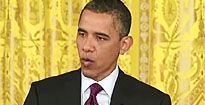Obama foreign policy based on anti-colonialism
Tablet Magazine reports
Last week President Barack Obama’s administration announced that it was going to engage Egypt’s Muslim Brotherhood. As the White House explained, American officials from previous administrations have already met with members of the prominent Islamist party—a party that, it’s worth noting, has been resolutely anti-Western and viciously anti-Zionist since its founding in 1928. Obama administration officials said that they wish to expand contacts with the Brotherhood because they perceive, correctly, that the movement is likely to become an even bigger factor in regional politics.
The Arab Spring surely has something to do with Obama’s new approach, but it is hardly the sole or even the main cause of a shift that has turned U.S. Middle East policy on its head. So, what is?
Even before pro-U.S. regimes in Tunis and Cairo were toppled, Obama had said that he opposed the existing U.S.-backed order in the Middle East, which has rested on close military and diplomatic alliances with Israel, Egypt, Saudi Arabia, and Jordan, and a substantial American military presence in the Persian Gulf. Most observers assumed that the president was indulging in rhetorical flights of fancy when he said that the status quo was unsustainable. But now we see he meant every word of it.
The existing political order in the Middle East has cost the Unites States hundreds of billions of dollars and thousands of lives over the past 60 years. In some cases, such as Israel, our alliances have been built on cultural affinity, military necessity, and domestic political considerations. In other cases, such as Saudi Arabia, our considerations have been more commercial. The larger point of U.S. engagement in the region has been to ensure the freedom of crucial shipping lanes and the flow of oil—without which the global economy that sustains billions of people around the world would grind to a halt.
Given the strong Wilsonian streak in U.S. politics, one might imagine that Obama is a staunch idealist—a man who, like Woodrow Wilson, Jimmy Carter, or George W. Bush, is disgusted by dictators. But Obama’s shameful record as a protector of human rights in the Middle East hardly bears out this theory: Iran’s Green Revolutionaries begged Obama for support for weeks, only to be greeted first with silence while being shot, tortured, and maimed by the mullahs and their goons, and then by lukewarm support, and now again with silence. Syria’s authoritarian rulers shoot their own people in the streets and bombard civilian neighborhoods with tanks and helicopter gunships, but the White House is virtually mum.
So, Obama is clearly not being driven by an obsession with human rights. Perhaps he is a wily master of realpolitik? A leader of this kind—like, say, Richard Nixon—would support the United States’ powerful friends, like Saudi Arabia and Israel, while seeking to constrain the power of its enemies, like Syria and Iran. Yet Obama has so significantly alienated the Saudis that they have embarked on their own cash-heavy royalist-oriented foreign policy, seeking to woo American allies like Jordan and Bahrain and even Pakistan into a new alliance devoted in large part to blocking Obama’s destabilizing policies in the region. Obama picks fights with Israel and then suddenly demands the Jewish state return to its 1967 borders as a condition for negotiating a peace agreement with the Palestinians—and is publicly rebuked by the Israeli prime minister, with the support of the U.S. Congress. Losing the trust and support of both Saudi Arabia and Israel in the space of a few months is hardly the move of a leader driven by realpolitik.
Perhaps, as some right-wing critics claim, Obama’s policy is the product of something worse, or more sinister, like a blueprint to weaken America on behalf of its enemies? Except this doesn’t fly either. Obama’s no Manchurian candidate, brainwashed by U.S. enemies during his schooldays in Indonesia to ruin the country. Instead, what all these theories miss is that Obama is simply a representative man of the post-World War II American Ivy League intelligentsia, which came to see the United States in a context shaped by the collapse of the European colonial empires under the weight of greed and barbarity.


